人教版(2019) 必修第三册 Unit 5 The Value of Money 单词及重点句式课件(共70张PPT)
文档属性
| 名称 | 人教版(2019) 必修第三册 Unit 5 The Value of Money 单词及重点句式课件(共70张PPT) | 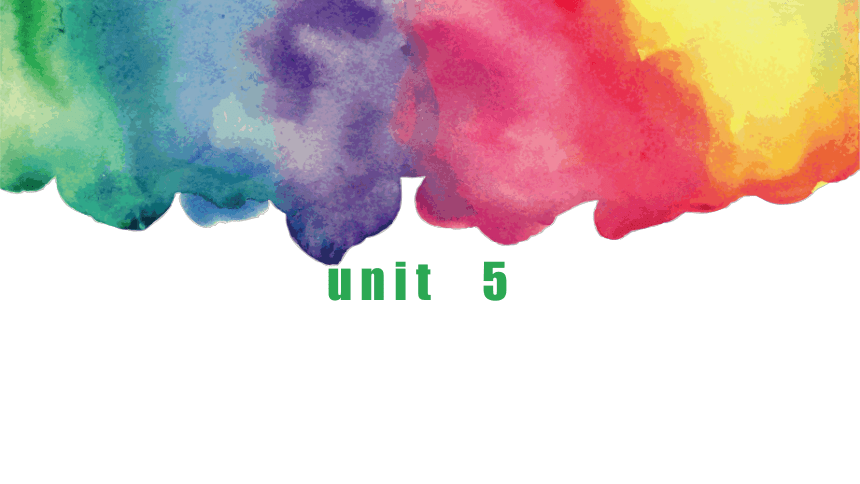 | |
| 格式 | zip | ||
| 文件大小 | 7.7MB | ||
| 资源类型 | 教案 | ||
| 版本资源 | 人教版(2019) | ||
| 科目 | 英语 | ||
| 更新时间 | 2022-06-23 19:05:41 | ||
图片预览

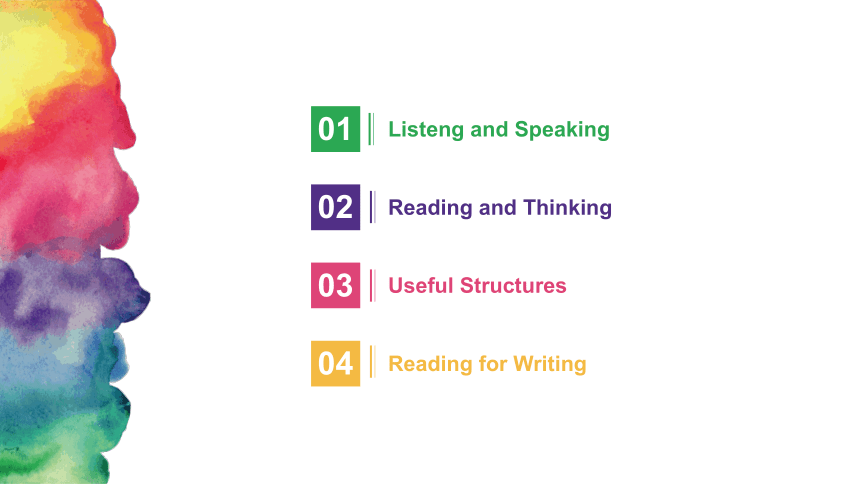
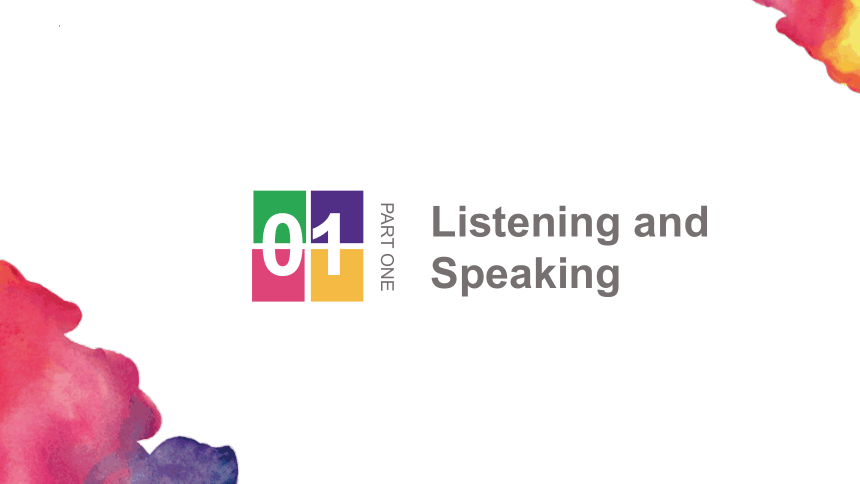
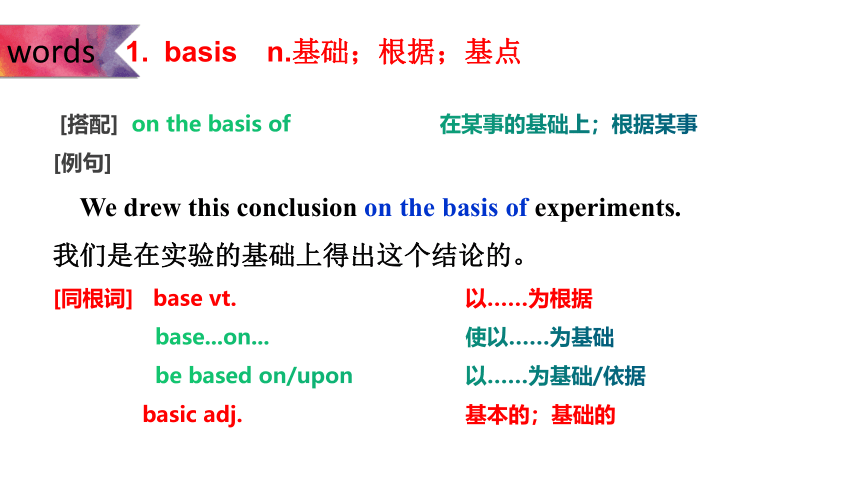


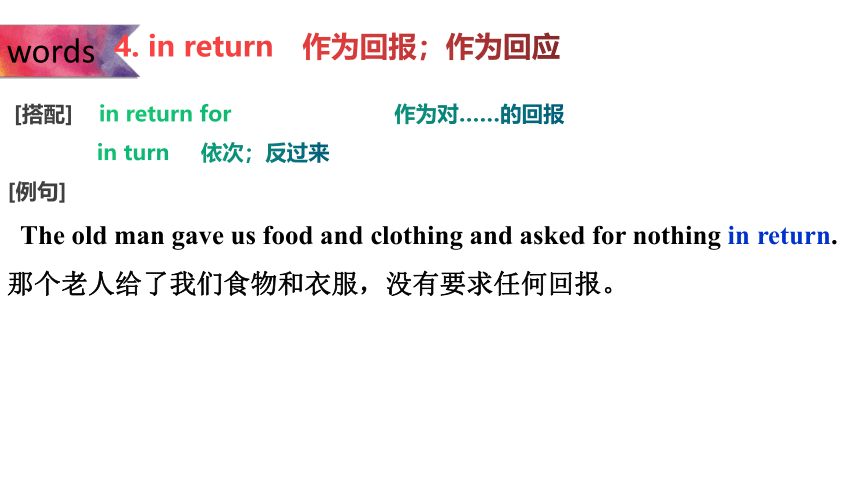
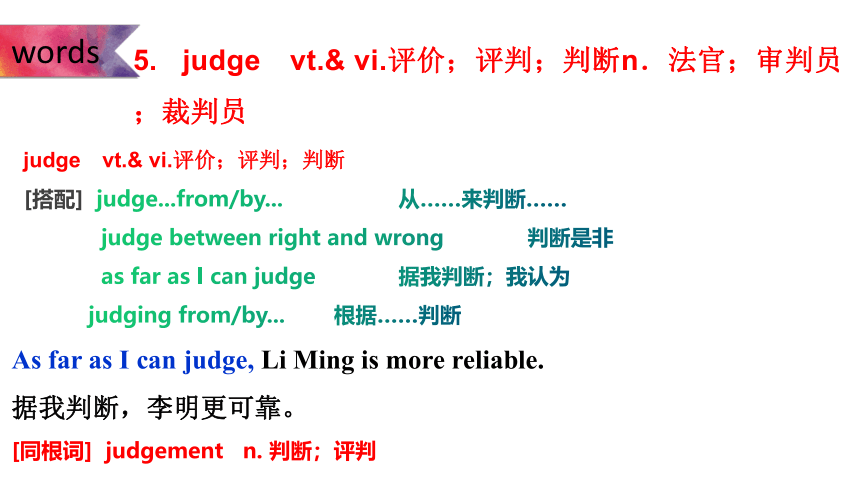
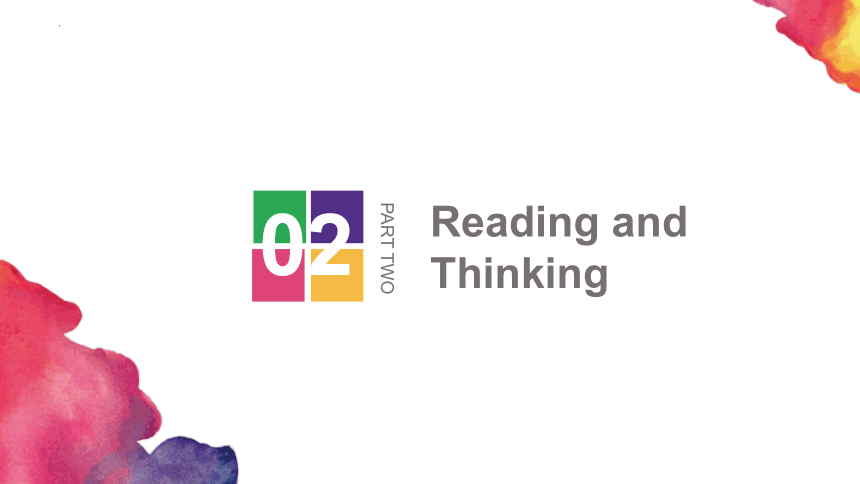
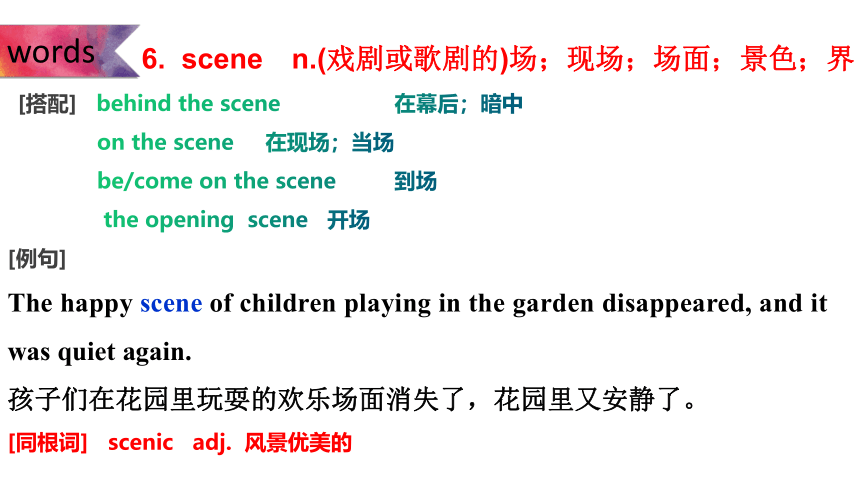

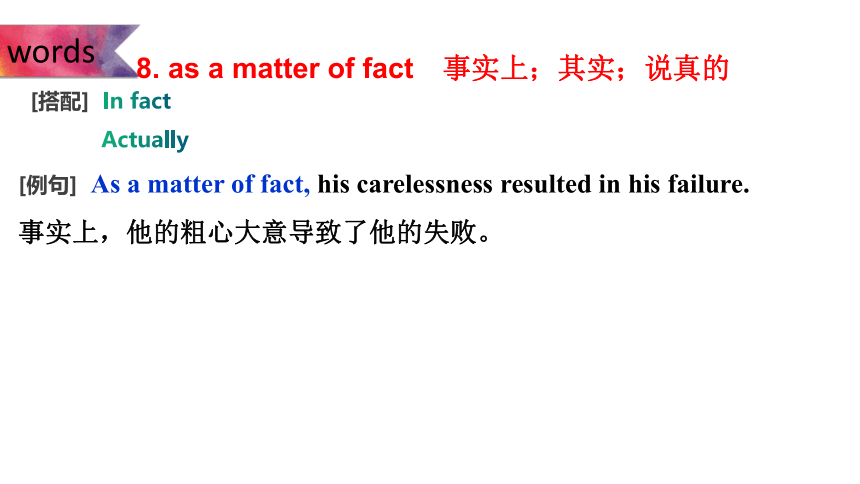
文档简介
(共70张PPT)
u n i t 5
01
02
03
04
Listeng and Speaking
Reading and Thinking
Useful Structures
Reading for Writing
01
PART ONE
Listening and Speaking
1. basis n.基础;根据;基点
words
[搭配] on the basis of 在某事的基础上;根据某事
[例句]
We drew this conclusion on the basis of experiments.
我们是在实验的基础上得出这个结论的。
[同根词] base vt. 以……为根据
base...on... 使以……为基础
be based on/upon 以……为基础/依据
basic adj. 基本的;基础的
[搭配] apologise to sb. for (doing) sth. 因(做)某事向某人道歉
[例句]
You must apologise to her for having kept her waiting so long.
让她等了这么久,你必须向她道歉。
[同根词] apology n. 道歉;辩白
make an apology to sb. for (doing) sth. 因(做)某事向某人道歉
accept/refuse one's apology 接受/拒绝某人的道歉
2.apologise vi.道歉;谢罪
words
[搭配] ignore one's advice/mistakes 忽视某人的建议/过错
ignore traffic rules 无视交通规则
ignore the fact that...... 忽略......的事实
[例句]
It would be a mistake to ignore their advice.
忽视他们的建议是错误的。
[同根词] ignorance n. 无知,愚昧
out of/through ignorance 出于无知
ignorant adj. 无知的;愚昧的
be ignorant of /about sth. 对......无知
3. ignore vt.忽视;对……不予理会
words
[搭配] in return for 作为对……的回报
in turn 依次;反过来
[例句]
The old man gave us food and clothing and asked for nothing in return.
那个老人给了我们食物和衣服,没有要求任何回报。
4. in return 作为回报;作为回应
words
judge vt.& vi.评价;评判;判断
[搭配] judge...from/by... 从……来判断……
judge between right and wrong 判断是非
as far as I can judge 据我判断;我认为
judging from/by... 根据……判断
As far as I can judge, Li Ming is more reliable.
据我判断,李明更可靠。
[同根词] judgement n. 判断;评判
5. judge vt.& vi.评价;评判;判断n.法官;审判员;裁判员
words
02
PART TWO
Reading and Thinking
[搭配] behind the scene 在幕后;暗中
on the scene 在现场;当场
be/come on the scene 到场
the opening scene 开场
[例句]
The happy scene of children playing in the garden disappeared, and it was quiet again.
孩子们在花园里玩耍的欢乐场面消失了,花园里又安静了。
[同根词] scenic adj. 风景优美的
6. scene n.(戏剧或歌剧的)场;现场;场面;景色;界
words
7. 1 bet n. 打赌;赌注
[搭配] make a bet with sb. 和某人打赌
win/lose a bet 赌赢/输
for a bet 为了打赌
you bet 当然;肯定的
7. 1 bet v. 下赌注;用......打赌 敢说
[搭配] bet on sth. 对某事打赌,在某事上下赌注
I bet 我敢说;我断定
[例句]
Would you bet on the future of this man
7. bet n. 打赌;赌注 v. 下赌注;用......打赌 敢说
words
[搭配] In fact
Actually
[例句] As a matter of fact, his carelessness resulted in his failure.
事实上,他的粗心大意导致了他的失败。
8. as a matter of fact 事实上;其实;说真的
words
[搭配] by chance 偶然;碰巧
by design 故意地
on purpose 故意地
by mistake 错误地
[例句] They said that all the injuries were caused by accident.
他们说所有的伤都是意外造成的。
9. by accident 偶然地;意外地
words
10. 1 spot vt. 看见;注意到;发现
[搭配] spot sb.doing sth. 看到某人正在做某事
be spotted by 被……发现
be spotted with 满是……斑点;被……点缀
[例句] He spotted a man entering the spot where a heated discussion was on. 他看见一个人进入正在热烈讨论的地方。
10. 2 spot n.地点;处所;斑点;污迹
[搭配] on the spot 当场;在现场;立即
10. spot vt. 看见;注意到;发现n.地点;处所;斑点;污迹
words
[搭配] have/lose patience with 对……有/失去耐心
have the patience to do sth. 有耐心做某事
with patience 耐心地
[例句] I began to lose patience with him, for he made me rather embarrassed.
我开始对他失去耐心,因为他使我相当尴尬。
11.patience n.耐心;忍耐力;毅力
words
[同根词] impatience n. 不耐烦
patient adj. 能忍耐的;有耐心的 n. 病人
be patient with sb. 对某人有耐心
patiently (=with patience) adv. 耐心地
11.patience n.耐心;忍耐力;毅力
words
[搭配] be honest with sb. 对某人坦诚
It is honest of sb. to do sth. 对某人来说做某事是诚实的。
honestly speaking 说实在地;老实说
[例句] It is honest of you to tell your parents the truth.
你把真相告诉父母是诚实的。
[同根词] honesty n. 诚实;坦诚
12.to be honest 说实话;坦率地说
words
[搭配] be about to do sth.when... 正要做某事这时(另一件事情发生了)
had just done sth. when... 刚做过某事这时(另一件事情发生了) be doing sth. when... 正在做某事这时(另一件事情发生了)
[例句]
He was about to go to school when a strong wind began to blow.
他正要去上学,这时突然刮起了大风。
13. be about to do sth. 即将或正要(做某事)
words
That's why we've given you the letter.
那就是为什么我们把信给你。
“That's why...”意为“那就是为什么……”
(1)“This/That is why...”意为“这/那就是为什么……”,其中why引导表语从句,强调结果。
(2)“That‘s because...”意为“那是因为……”,because引导表语从 句,强调原因。
(3)“The reason why...is/was that...”意为“……的原因是……”,表语从句常用that 引导,而不用because。
sentences
“That's why...”意为“那就是为什么……”
①Tom overslept this morning. That is why he was late for work.
汤姆今天早晨睡过头了,那就是为什么他上班迟到了。
②I'm writing to make an apology to you for not being able to attend the party. That's because I have to go to the airport to pick up my friend.
我写信向你道歉我无法参加宴会了。那是因为我必须去机场接我的朋友。
sentences
[搭配] indicate that... 表示……;示意……
As is indicated in... 正如……所示
indicate sth.to sb. 向某人指出……
[例句]
His attitude indicates that he is not very happy with what you are doing.
他的态度表明他对你的所作所为很不高兴。
[同根词] indication n. 指示;标示
give sb. indication 向某人表明
14. indicate vt.& vi.表明;显示 vt.象征;暗示
words
[搭配] postpone...to/until... 推迟……到……
postpone doing sth. 推迟做某事
[例句]
The weather being bad, we had to postpone our trip.
由于天气不好,我们不得不推迟旅行。
15. postpone vt.延迟;延期;延缓
words
03
PART THREE
Useful Structures
情态动词
一、情态动词的意义
情态动词本身有一定的词义,表示说话人的某种感情或语气,对某一动作或状态的某种态度,表示“需要”“可以”“必须” “应当”等意义。、
◆(2021·全国乙卷)In my opinion, students can benefit a lot from doing some housework.
在我看来,学生可以从做一些家务中受益很多。
(1)情态动词不能单独作谓语,除ought to和used to以外,情态动词后面接不带to的动词原形。
(2)情态动词没有人称和数的变化,但是有些情态动词,如 can、 will、may等,有现在式和过去式的变化。
(3)情态动词的“时态”的形式并不是区分时间的主要标志。不少情况下,情态动词的现在式形式和过去式形式都可用来表示现在时 间、过去时间或将来时间。
二、情态动词的基本用法
1.can/could
(1)表示能力,指有能力做某事。could为can的过去式。
◆(2020·7月天津卷)Jim says we can stay in his house as long as we leave it clean and tidy.
吉姆说我们可以住在他的房子里,只要我们保持干净、整洁。
(2)表示请求或允许。could比can语气更加委婉。
◆I wonder if you could do me a favour
你能帮我个忙吗?
(3)表示推测,意为“可能”,常用于否定句和疑问句中。
◆He is such a gentle man, so he can't be rude to you.
他是如此温柔的人,因此他不可能对你粗鲁。
(4)表示推测,意为“有时会”,常用于肯定句中。
◆(全国卷Ⅱ)With such busy lives, it can be hard to try and find the time to work out.
生活如此忙碌,尝试并找到时间锻炼有时会很困难。
(5)can的其他用法。
①“can't+be/行为动词+比较级”表示“再没有比……更……的了”。
◆It can not be better to have such a nice audience like you.
有你们这样的听众,真是再好不过了。
②“can't+动词原形+too.../...enough”表示“无论怎么……也不为过”。
◆When it comes to making friends, you cannot be too careful. 一谈到交朋友,你再怎么小心也不为过。
③“can't+help+doing sth.”表示“禁不住做某事”。
◆On hearing the funny story, we can't help laughing.
一听到这个滑稽的故事,我们就忍不住笑出来。
④“can't+choose/help...+but+动词原形”表示“不得不,只好”。
◆He is such an unselfish man. You cannot help but respect him. 他是这样一个毫无私心的人。你不得不尊敬他。
can,could和be able to的区别:can只有现在式和过去式,而be able to可以用于各种时态;can( could)表示能力时,可用be able to代替。
◆I can(am able to) afford the car.
我能买得起这辆小汽车。
◆She has been able to come to school.
她已经能去学校了
◆I could(=was able to) drive a car before I left school.
毕业前我就会开车。
口诀记忆can/could
can表能力和可以,
否定、疑问(在否定句及疑问句中)表猜疑。
could为can的过去式,
语气比can更客气。
2.may/might
(1)表示允许、许可。might在语气上比may更委婉。以may/might开头的问句在否定回答中要用mustn't。
◆If you're interested in it, you may either send an email to 12345@ or sign up in person. 如果你感兴趣的话,你可以发送邮件至12345@或亲自注册。
(2)表示把握不大的推测,意为“可能、也许”,用于肯定句或否定句中,might语气更加不确定。
◆In your lifetime, you may succeed at some point due to your talent or fortune. 在你的一生中,你或许会由于你的才华或运气而在某个时间点取得成功。
(3)may和might的其他用法。
①“may+主语+动词原形”表示祝愿。
◆May you have a good time and enjoy your stay here.
祝你玩得高兴,享受在这儿逗留的时光。
②“may/might as well+动词原形”意为“最好、不妨、还不 如”。
◆Lastly, we may as well walk or cycle to school, which won't cause air pollution. 最后,我们最好走着或骑自行车去上学,这样不会造成空气污染。
3.will/would
(1)表示意愿,would是will的过去式。
◆I told her to stop crying, but she just wouldn't listen.
我叫她别哭了,但她就是不听。
◆He asked if I would go with him
他问我是否愿意和他一起去。
(2)表示征求意见或提出请求。would的语气更加委婉。
◆Would you be kind enough to spare some time for us
您可以为我们挤出点儿时间来吗?
(3)表示习惯或特性(倾向性)以及自然的规律性。will用于现在,would用于过去。翻译为“总是”。
◆Oil will float on water. 油总是浮在水面上。
◆He would come to help us when he was free.
他有空时会来帮助我们的。
(4)表示推测,意为“可能、大概”。
◆Ask him. He will know.
问他,他大概知道。
4.shall/should
(1)shall
①shall用于疑问句中,表示征求对方的意见;这时可以用第一人称和第三人称。
◆Shall we go there together this Friday afternoon
我们可以在本周五下午一块儿去那里吗?
②shall用于陈述句,与第二人称或第三人称连用,表示允诺、命令、警告和强制,或表示说话人的决心等。
◆You shall fail if you don't work harder.
如果你再不努力些,你会失败的。
(2)should
①表示责任和义务,意为“应该”。
◆(2021·全国甲卷)In my opinion, when in trouble, we should seek help from those we trust most.
在我看来,当遇到困难时,我们应该向信任的人寻求帮助。
②表示推测,指有一定根据的推测,意为“按道理应该”。
◆If your smoke detector is working properly, the red light should be on.
如果你的烟雾报警器正常运转,红灯应该亮着。
③表示惊讶,意为“竟会、居然”。
◆It's strange that he should have taken the books without the owner's permission.
真奇怪,他竟然未经主人的许可就拿走了书。
ought to和should的区别
①ought to和should没有区别,因为两者可以互换,只是ought to的语气略强。
②表示出于法令规则、行为准则、道德责任等客观情况而“应该”做某事,通常用ought to;若用should则含有个人意见,强调主观看法。
◆You are older brother.You ought to take care of your little sister.
你是哥哥,你应该照顾好你的妹妹。
◆You should not waste time in watching TV.
你不应该看电视来浪费时间。
5.must
(1)must表示义务或强制,一定要,指说话人的主观语气。
①must用于一般疑问句时,其肯定答语应用“Yes, you must.”,其否定答语应用“No, you needn't.”或“No, you don't have to.”。
②must的否定式must not/mustn't表示禁止。
◆—Must I go there with you 我必须和你一起去那里吗?
—Yes, you must.(No, you needn't./No, you don't have to.)是的,必须。(不,没必要。)
(2)must表示说话人有把握的猜测,仅限于肯定句,否定句中用can’t/couldn’t来代替。
◆She must be very tired after such a long walk.
走了这么长的路,她一定很累了。
(3)must表示“偏要、偏偏”。
◆If you must go, at least wait until the storm is over.
如果你非要走的话,至少等到暴风雨结束。
6.have to
表示不得不,说明客观条件只能如此;有时态形式的变化;否定式don’t have to意为"不必"(=needn’t)
◆My brother was very ill, so I had to call the doctor in the midnight.
我弟弟病得厉害,我只得半夜里把医生请来。
◆I haven’t got any money with me, so I’ll have to borrow some from my friend. 我身上没带钱,只好向朋友借点了。
must和have to的区别:
①用must表示"必须"的意思时,通常着重于说话者的主观看法,认为有必要去做某事;而have to着重于客观需要,含有"不得不"的意思。
◆We must study English hard. 我们必须努力学习英语。
◆You are ill today. You have to see a doctor. 你今天病了,不得不去看医生。
must和have to的区别:
②用must表示"必须",只有现在时态的形式,如果要表示过去时或将来时的"必须",就要用have to的相应形式。
◆You must drive fast to catch the time. 你必须开车开快点来赶时间。
◆They will have to leave tomorrow morning. 他们必须明天早晨起程。
7.need
(1)表示义务,职责时,意为"应当,应该",往往表示说话者的观点
(2)表示惊讶、遗憾等,意为"竟然,居然"
(3)表示"需要,必须",多用于疑问句和否定句
◆Need you go so soon 你需要这么早走吗
◆You needn’t come so early. 你不必来这么早。
①need的一般疑问句,肯定回答为Yes, ... must.;否定回答为No, ... needn’t.
◆—Need he finish the article next week 他需要下星期完成这篇文章吗
—Yes, he must. 是的,他必须完成。/No , he needn’t. 不,他不需要。
三、情态动词+have done
情态动词+have done
must have done 对过去的肯定推测,意为“过去肯定……” It must have rained last night, for the road was quite wet.
昨晚肯定下雨了,因为路面十分潮湿。
情态动词+have done
can't/ couldn't have done 对过去的否定推测,意为“过去不可能做了……” He couldn't have known the decision, but someone told him.
他一定不知道这个决定,但是有人告诉他了。
could have done 本来能够 做而没做 You could have made greater progress, but you didn't try your best.
你本能够取得更大的进步,但是你并没有尽全力。
情态动词+have done
may/might (not) have done 可能(没有) 做过某事 You may have dropped it when you were shopping in the market.
你或许是在市场买东西的时候(把它)掉了。
ought (not) to/should(not) have done 本来该做而没做/本来不该做而做了 You should have come to school if you were really serious about your study.
要是你真的认真对待学习的话,你本应该来上学的。
情态动词+have done
needn't have done 本来不必 做却做了 You needn't have telephoned him, for he had known the result.
你本不必打电话给他,因为他已经知道结果了。
过去将来时
一、过去将来时的用法
过去将来时表示在过去某一时间看将要发生的动作或存在的状态。过去将来时常用在主句谓语动词为一般过去时的宾语从句中。
◆I thought he wouldn't attend the evening party, but to my surprise, he came.
我原以为他不会参加这个晚会,但是令我惊讶的是他来了。
◆I told her I would return the book in a few days.
我告诉过她,我将在几天后还书。
二、过去将来时的表示方法
1.would/should+动词原形(would用于所有人称,should只用于第一人称)。
◆She told us that she would not go with us if it rained.
她告诉我们,如果下雨的话她就不和我们一起去了。
◆I telephoned him yesterday to ask what I should do next week.
我昨天给他打电话,问我下周干什么。
2.was/were going to do sth.表示过去打算/计划做某事或客观迹象表明要发生的事。
◆I was going to see Mr Brown the next day,but the appointment was cancelled.
我本打算第二天去看布朗先生的,但预约被取消了。
◆I thought it was going to rain. 我想要下雨了。
3.was/were about to do sth.表示过去正要/即将做某事,一般不与时间状语连用。
◆When I got there they were about to leave.
我到那儿的时候他们正要离开。
4.was/were to do sth.表示过去计划或安排将要做某事。
◆He said he was to finish the work in a week.
他说他打算一星期内完成这项工作。
◆The students were to visit the museum the next day.
学生们第二天要去参观博物馆。
5.was/were+doing表示过去将来时时,仅限于go、come、leave、start、take off等趋向性动词(短语)。
◆I didn't know they were coming.
我并不知道他们要来。
◆David was leaving for Shanghai in a few days.
大卫几天以后要去上海。
[搭配] be under obligation 有义务;有责任
a sense of obligation 责任感;义务感
[例句] She didn’t feel under any obligation to tell him the truth.
[同根词] oblige v. 迫使,强迫;帮忙,效劳
oblige sb. to do sth.(以法律、义务等)
obliged adj.感激;感谢
be obliged to sb. to do sth. 因某事感激某人
I would be obliged if you would/could ... 如果你能.......我将不胜感激
obligated adj. 有义务的;有责任的
16.obligation n. 义务;职责;责任
words
[搭配] with the intention of 目的是……
good intentions 善意;良好的意向
without intention 无意地
have no intention of doing sth. 无意做某事
[例句]
To be honest, I have no intention of changing my plan.
老实说,我无意改变我的计划。
17. intention n.打算;计划;意图;目的
words
[同根词] intend vt. 计划;打算
intend doing/to do sth. 打算做某事
intend sb./sth.to do sth. 打算让某人/物做某事
intended adj. 为......打算的
be intended to do... 为了做……
be intended for... 专门为……而设计的;专供……使用的
17. intention n.打算;计划;意图;目的
words
[搭配] in case of 万一;在……情形时;如果发生
in this/that case 在这/那种情况下
in any case 无论如何;总之
in no case 在任何情况下都不(位于句首时部分倒装)
as is often the case 这是常有的事
[例句]
As is often the case, people tend to talk loudly in public places. 人们在公共场所往往大声讲话,这是常见的事。
18.in case 以防;以防万一
words
[搭配] to...extent 到……程度;在……程度上
to some extent 在某种程度上
to a certain extent 在某种程度上
to a large/great extent 在很大程度
[例句]
It is difficult to assess the extent of the damage.
很难评估受损的程度。
19.extent n.程度;限度;大小;范围
words
[搭配] pursue one's dream/aim/goal 追逐某人的梦想/目标
pursue sb. 追求某人/追捕某
[例句]
All our dreams can come true, if we have the courage to pursue them.
我们所有的梦想都能实现,只要我们有勇气去追求它们。
[同根词] persuit n. 追求;事业;消遣
20. pursue vt.追求;致力于;执行;贯彻
words
[搭配] a sense of duty 责任感
perform one’s duty 尽职责
carry out one’s duty 履行职责
be on duty 值班;执勤
be off duty 不值班;不执勤
It’s one’s duty to do sth. 做某事是某人的责任。
[例句]
Doing volunteer work gives her a sense of duty.
21. duty n. 责任;义务;职责;值班
words
04
PART FOUR
Reading for writing
[搭配] hesitate to do sth. 迟疑做某事;不愿做某事
hesitate about/in/at/over (doing) sth.对(做)某事犹豫不决
[例句]
Don't hesitate to call if there is something wrong with the computer.
如果电脑出现了问题,随时打电话。
[同根词] hesitation n. 踌躇;犹豫;迟疑
without hesitation 毫不犹豫地
have no hesitation in doing sth. 毫不犹豫地做某事
22. hesitate vi.犹豫;迟疑;顾虑
words
23.manner n.举止;行为方式;方法;[pl.]礼貌;礼仪
words
[搭配] in a(n)...manner 以……的方式
manners n. 礼貌;礼仪;习俗
It's good/bad manners to do sth. 做某事是有/没礼貌的。
mind one’s manners 注意点儿礼貌
[例句] Finally, mind your own manners and remain modest and honest when getting along with your British friends.
最后,与英国朋友相处时,你要注意个人礼貌,要谦虚、诚实。
[搭配] with a broad smile 笑容满面
broad support 广泛的支持
[例句] With a broad smile, the boy came up to his mother.
男孩笑容满面,向他妈妈走来。
[同根词] broaden vt. 使扩大;使变宽
broaden one's view/horizons 开拓某人的视野
24. broad adj.宽阔的;广阔的;广泛的
words
[搭配] be willing to do sth. 愿意或乐意做某事
[例句] Mary is very selfish and unkind; that's why I am unwilling to make friends with her.
玛丽很自私、不友善,这就是我不愿意和她交朋友的原因。
25. willing adj.愿意;乐意
words
[同根词] unwilling adj. 不愿意;不乐意
be unwilling to do sth. 不愿意或不乐意做某事
willingness n. 乐意
[搭配] maintain a balance 保持平衡
maintain a friendship 维持友谊
maintain one's strength 保持某人的体力
[例句] I'd like to give some advice about how to maintain a friendship.
我想就如何维持友谊给出一些建议。
26. maintain vt.维持;保持;维修;保养
words
[搭配] ask for (one's) permission 请求(某人的)允许
with/without permission 允许/未经允许
give sb. permission to do sth. 允许某人做某事
[例句]
You'd better ask for the teacher's permission to leave before you go.
在你走之前,你最好请求老师准许。
[同根词] permit vt.& vi.允许;准许;使有可能 n. 通行证;许可证
permit sb. to do sth. 允许某人做某事
permit doing sth. 允许做某事
26. permission n. 准许;许可;批准;许可证
words
u n i t 5
01
02
03
04
Listeng and Speaking
Reading and Thinking
Useful Structures
Reading for Writing
01
PART ONE
Listening and Speaking
1. basis n.基础;根据;基点
words
[搭配] on the basis of 在某事的基础上;根据某事
[例句]
We drew this conclusion on the basis of experiments.
我们是在实验的基础上得出这个结论的。
[同根词] base vt. 以……为根据
base...on... 使以……为基础
be based on/upon 以……为基础/依据
basic adj. 基本的;基础的
[搭配] apologise to sb. for (doing) sth. 因(做)某事向某人道歉
[例句]
You must apologise to her for having kept her waiting so long.
让她等了这么久,你必须向她道歉。
[同根词] apology n. 道歉;辩白
make an apology to sb. for (doing) sth. 因(做)某事向某人道歉
accept/refuse one's apology 接受/拒绝某人的道歉
2.apologise vi.道歉;谢罪
words
[搭配] ignore one's advice/mistakes 忽视某人的建议/过错
ignore traffic rules 无视交通规则
ignore the fact that...... 忽略......的事实
[例句]
It would be a mistake to ignore their advice.
忽视他们的建议是错误的。
[同根词] ignorance n. 无知,愚昧
out of/through ignorance 出于无知
ignorant adj. 无知的;愚昧的
be ignorant of /about sth. 对......无知
3. ignore vt.忽视;对……不予理会
words
[搭配] in return for 作为对……的回报
in turn 依次;反过来
[例句]
The old man gave us food and clothing and asked for nothing in return.
那个老人给了我们食物和衣服,没有要求任何回报。
4. in return 作为回报;作为回应
words
judge vt.& vi.评价;评判;判断
[搭配] judge...from/by... 从……来判断……
judge between right and wrong 判断是非
as far as I can judge 据我判断;我认为
judging from/by... 根据……判断
As far as I can judge, Li Ming is more reliable.
据我判断,李明更可靠。
[同根词] judgement n. 判断;评判
5. judge vt.& vi.评价;评判;判断n.法官;审判员;裁判员
words
02
PART TWO
Reading and Thinking
[搭配] behind the scene 在幕后;暗中
on the scene 在现场;当场
be/come on the scene 到场
the opening scene 开场
[例句]
The happy scene of children playing in the garden disappeared, and it was quiet again.
孩子们在花园里玩耍的欢乐场面消失了,花园里又安静了。
[同根词] scenic adj. 风景优美的
6. scene n.(戏剧或歌剧的)场;现场;场面;景色;界
words
7. 1 bet n. 打赌;赌注
[搭配] make a bet with sb. 和某人打赌
win/lose a bet 赌赢/输
for a bet 为了打赌
you bet 当然;肯定的
7. 1 bet v. 下赌注;用......打赌 敢说
[搭配] bet on sth. 对某事打赌,在某事上下赌注
I bet 我敢说;我断定
[例句]
Would you bet on the future of this man
7. bet n. 打赌;赌注 v. 下赌注;用......打赌 敢说
words
[搭配] In fact
Actually
[例句] As a matter of fact, his carelessness resulted in his failure.
事实上,他的粗心大意导致了他的失败。
8. as a matter of fact 事实上;其实;说真的
words
[搭配] by chance 偶然;碰巧
by design 故意地
on purpose 故意地
by mistake 错误地
[例句] They said that all the injuries were caused by accident.
他们说所有的伤都是意外造成的。
9. by accident 偶然地;意外地
words
10. 1 spot vt. 看见;注意到;发现
[搭配] spot sb.doing sth. 看到某人正在做某事
be spotted by 被……发现
be spotted with 满是……斑点;被……点缀
[例句] He spotted a man entering the spot where a heated discussion was on. 他看见一个人进入正在热烈讨论的地方。
10. 2 spot n.地点;处所;斑点;污迹
[搭配] on the spot 当场;在现场;立即
10. spot vt. 看见;注意到;发现n.地点;处所;斑点;污迹
words
[搭配] have/lose patience with 对……有/失去耐心
have the patience to do sth. 有耐心做某事
with patience 耐心地
[例句] I began to lose patience with him, for he made me rather embarrassed.
我开始对他失去耐心,因为他使我相当尴尬。
11.patience n.耐心;忍耐力;毅力
words
[同根词] impatience n. 不耐烦
patient adj. 能忍耐的;有耐心的 n. 病人
be patient with sb. 对某人有耐心
patiently (=with patience) adv. 耐心地
11.patience n.耐心;忍耐力;毅力
words
[搭配] be honest with sb. 对某人坦诚
It is honest of sb. to do sth. 对某人来说做某事是诚实的。
honestly speaking 说实在地;老实说
[例句] It is honest of you to tell your parents the truth.
你把真相告诉父母是诚实的。
[同根词] honesty n. 诚实;坦诚
12.to be honest 说实话;坦率地说
words
[搭配] be about to do sth.when... 正要做某事这时(另一件事情发生了)
had just done sth. when... 刚做过某事这时(另一件事情发生了) be doing sth. when... 正在做某事这时(另一件事情发生了)
[例句]
He was about to go to school when a strong wind began to blow.
他正要去上学,这时突然刮起了大风。
13. be about to do sth. 即将或正要(做某事)
words
That's why we've given you the letter.
那就是为什么我们把信给你。
“That's why...”意为“那就是为什么……”
(1)“This/That is why...”意为“这/那就是为什么……”,其中why引导表语从句,强调结果。
(2)“That‘s because...”意为“那是因为……”,because引导表语从 句,强调原因。
(3)“The reason why...is/was that...”意为“……的原因是……”,表语从句常用that 引导,而不用because。
sentences
“That's why...”意为“那就是为什么……”
①Tom overslept this morning. That is why he was late for work.
汤姆今天早晨睡过头了,那就是为什么他上班迟到了。
②I'm writing to make an apology to you for not being able to attend the party. That's because I have to go to the airport to pick up my friend.
我写信向你道歉我无法参加宴会了。那是因为我必须去机场接我的朋友。
sentences
[搭配] indicate that... 表示……;示意……
As is indicated in... 正如……所示
indicate sth.to sb. 向某人指出……
[例句]
His attitude indicates that he is not very happy with what you are doing.
他的态度表明他对你的所作所为很不高兴。
[同根词] indication n. 指示;标示
give sb. indication 向某人表明
14. indicate vt.& vi.表明;显示 vt.象征;暗示
words
[搭配] postpone...to/until... 推迟……到……
postpone doing sth. 推迟做某事
[例句]
The weather being bad, we had to postpone our trip.
由于天气不好,我们不得不推迟旅行。
15. postpone vt.延迟;延期;延缓
words
03
PART THREE
Useful Structures
情态动词
一、情态动词的意义
情态动词本身有一定的词义,表示说话人的某种感情或语气,对某一动作或状态的某种态度,表示“需要”“可以”“必须” “应当”等意义。、
◆(2021·全国乙卷)In my opinion, students can benefit a lot from doing some housework.
在我看来,学生可以从做一些家务中受益很多。
(1)情态动词不能单独作谓语,除ought to和used to以外,情态动词后面接不带to的动词原形。
(2)情态动词没有人称和数的变化,但是有些情态动词,如 can、 will、may等,有现在式和过去式的变化。
(3)情态动词的“时态”的形式并不是区分时间的主要标志。不少情况下,情态动词的现在式形式和过去式形式都可用来表示现在时 间、过去时间或将来时间。
二、情态动词的基本用法
1.can/could
(1)表示能力,指有能力做某事。could为can的过去式。
◆(2020·7月天津卷)Jim says we can stay in his house as long as we leave it clean and tidy.
吉姆说我们可以住在他的房子里,只要我们保持干净、整洁。
(2)表示请求或允许。could比can语气更加委婉。
◆I wonder if you could do me a favour
你能帮我个忙吗?
(3)表示推测,意为“可能”,常用于否定句和疑问句中。
◆He is such a gentle man, so he can't be rude to you.
他是如此温柔的人,因此他不可能对你粗鲁。
(4)表示推测,意为“有时会”,常用于肯定句中。
◆(全国卷Ⅱ)With such busy lives, it can be hard to try and find the time to work out.
生活如此忙碌,尝试并找到时间锻炼有时会很困难。
(5)can的其他用法。
①“can't+be/行为动词+比较级”表示“再没有比……更……的了”。
◆It can not be better to have such a nice audience like you.
有你们这样的听众,真是再好不过了。
②“can't+动词原形+too.../...enough”表示“无论怎么……也不为过”。
◆When it comes to making friends, you cannot be too careful. 一谈到交朋友,你再怎么小心也不为过。
③“can't+help+doing sth.”表示“禁不住做某事”。
◆On hearing the funny story, we can't help laughing.
一听到这个滑稽的故事,我们就忍不住笑出来。
④“can't+choose/help...+but+动词原形”表示“不得不,只好”。
◆He is such an unselfish man. You cannot help but respect him. 他是这样一个毫无私心的人。你不得不尊敬他。
can,could和be able to的区别:can只有现在式和过去式,而be able to可以用于各种时态;can( could)表示能力时,可用be able to代替。
◆I can(am able to) afford the car.
我能买得起这辆小汽车。
◆She has been able to come to school.
她已经能去学校了
◆I could(=was able to) drive a car before I left school.
毕业前我就会开车。
口诀记忆can/could
can表能力和可以,
否定、疑问(在否定句及疑问句中)表猜疑。
could为can的过去式,
语气比can更客气。
2.may/might
(1)表示允许、许可。might在语气上比may更委婉。以may/might开头的问句在否定回答中要用mustn't。
◆If you're interested in it, you may either send an email to 12345@ or sign up in person. 如果你感兴趣的话,你可以发送邮件至12345@或亲自注册。
(2)表示把握不大的推测,意为“可能、也许”,用于肯定句或否定句中,might语气更加不确定。
◆In your lifetime, you may succeed at some point due to your talent or fortune. 在你的一生中,你或许会由于你的才华或运气而在某个时间点取得成功。
(3)may和might的其他用法。
①“may+主语+动词原形”表示祝愿。
◆May you have a good time and enjoy your stay here.
祝你玩得高兴,享受在这儿逗留的时光。
②“may/might as well+动词原形”意为“最好、不妨、还不 如”。
◆Lastly, we may as well walk or cycle to school, which won't cause air pollution. 最后,我们最好走着或骑自行车去上学,这样不会造成空气污染。
3.will/would
(1)表示意愿,would是will的过去式。
◆I told her to stop crying, but she just wouldn't listen.
我叫她别哭了,但她就是不听。
◆He asked if I would go with him
他问我是否愿意和他一起去。
(2)表示征求意见或提出请求。would的语气更加委婉。
◆Would you be kind enough to spare some time for us
您可以为我们挤出点儿时间来吗?
(3)表示习惯或特性(倾向性)以及自然的规律性。will用于现在,would用于过去。翻译为“总是”。
◆Oil will float on water. 油总是浮在水面上。
◆He would come to help us when he was free.
他有空时会来帮助我们的。
(4)表示推测,意为“可能、大概”。
◆Ask him. He will know.
问他,他大概知道。
4.shall/should
(1)shall
①shall用于疑问句中,表示征求对方的意见;这时可以用第一人称和第三人称。
◆Shall we go there together this Friday afternoon
我们可以在本周五下午一块儿去那里吗?
②shall用于陈述句,与第二人称或第三人称连用,表示允诺、命令、警告和强制,或表示说话人的决心等。
◆You shall fail if you don't work harder.
如果你再不努力些,你会失败的。
(2)should
①表示责任和义务,意为“应该”。
◆(2021·全国甲卷)In my opinion, when in trouble, we should seek help from those we trust most.
在我看来,当遇到困难时,我们应该向信任的人寻求帮助。
②表示推测,指有一定根据的推测,意为“按道理应该”。
◆If your smoke detector is working properly, the red light should be on.
如果你的烟雾报警器正常运转,红灯应该亮着。
③表示惊讶,意为“竟会、居然”。
◆It's strange that he should have taken the books without the owner's permission.
真奇怪,他竟然未经主人的许可就拿走了书。
ought to和should的区别
①ought to和should没有区别,因为两者可以互换,只是ought to的语气略强。
②表示出于法令规则、行为准则、道德责任等客观情况而“应该”做某事,通常用ought to;若用should则含有个人意见,强调主观看法。
◆You are older brother.You ought to take care of your little sister.
你是哥哥,你应该照顾好你的妹妹。
◆You should not waste time in watching TV.
你不应该看电视来浪费时间。
5.must
(1)must表示义务或强制,一定要,指说话人的主观语气。
①must用于一般疑问句时,其肯定答语应用“Yes, you must.”,其否定答语应用“No, you needn't.”或“No, you don't have to.”。
②must的否定式must not/mustn't表示禁止。
◆—Must I go there with you 我必须和你一起去那里吗?
—Yes, you must.(No, you needn't./No, you don't have to.)是的,必须。(不,没必要。)
(2)must表示说话人有把握的猜测,仅限于肯定句,否定句中用can’t/couldn’t来代替。
◆She must be very tired after such a long walk.
走了这么长的路,她一定很累了。
(3)must表示“偏要、偏偏”。
◆If you must go, at least wait until the storm is over.
如果你非要走的话,至少等到暴风雨结束。
6.have to
表示不得不,说明客观条件只能如此;有时态形式的变化;否定式don’t have to意为"不必"(=needn’t)
◆My brother was very ill, so I had to call the doctor in the midnight.
我弟弟病得厉害,我只得半夜里把医生请来。
◆I haven’t got any money with me, so I’ll have to borrow some from my friend. 我身上没带钱,只好向朋友借点了。
must和have to的区别:
①用must表示"必须"的意思时,通常着重于说话者的主观看法,认为有必要去做某事;而have to着重于客观需要,含有"不得不"的意思。
◆We must study English hard. 我们必须努力学习英语。
◆You are ill today. You have to see a doctor. 你今天病了,不得不去看医生。
must和have to的区别:
②用must表示"必须",只有现在时态的形式,如果要表示过去时或将来时的"必须",就要用have to的相应形式。
◆You must drive fast to catch the time. 你必须开车开快点来赶时间。
◆They will have to leave tomorrow morning. 他们必须明天早晨起程。
7.need
(1)表示义务,职责时,意为"应当,应该",往往表示说话者的观点
(2)表示惊讶、遗憾等,意为"竟然,居然"
(3)表示"需要,必须",多用于疑问句和否定句
◆Need you go so soon 你需要这么早走吗
◆You needn’t come so early. 你不必来这么早。
①need的一般疑问句,肯定回答为Yes, ... must.;否定回答为No, ... needn’t.
◆—Need he finish the article next week 他需要下星期完成这篇文章吗
—Yes, he must. 是的,他必须完成。/No , he needn’t. 不,他不需要。
三、情态动词+have done
情态动词+have done
must have done 对过去的肯定推测,意为“过去肯定……” It must have rained last night, for the road was quite wet.
昨晚肯定下雨了,因为路面十分潮湿。
情态动词+have done
can't/ couldn't have done 对过去的否定推测,意为“过去不可能做了……” He couldn't have known the decision, but someone told him.
他一定不知道这个决定,但是有人告诉他了。
could have done 本来能够 做而没做 You could have made greater progress, but you didn't try your best.
你本能够取得更大的进步,但是你并没有尽全力。
情态动词+have done
may/might (not) have done 可能(没有) 做过某事 You may have dropped it when you were shopping in the market.
你或许是在市场买东西的时候(把它)掉了。
ought (not) to/should(not) have done 本来该做而没做/本来不该做而做了 You should have come to school if you were really serious about your study.
要是你真的认真对待学习的话,你本应该来上学的。
情态动词+have done
needn't have done 本来不必 做却做了 You needn't have telephoned him, for he had known the result.
你本不必打电话给他,因为他已经知道结果了。
过去将来时
一、过去将来时的用法
过去将来时表示在过去某一时间看将要发生的动作或存在的状态。过去将来时常用在主句谓语动词为一般过去时的宾语从句中。
◆I thought he wouldn't attend the evening party, but to my surprise, he came.
我原以为他不会参加这个晚会,但是令我惊讶的是他来了。
◆I told her I would return the book in a few days.
我告诉过她,我将在几天后还书。
二、过去将来时的表示方法
1.would/should+动词原形(would用于所有人称,should只用于第一人称)。
◆She told us that she would not go with us if it rained.
她告诉我们,如果下雨的话她就不和我们一起去了。
◆I telephoned him yesterday to ask what I should do next week.
我昨天给他打电话,问我下周干什么。
2.was/were going to do sth.表示过去打算/计划做某事或客观迹象表明要发生的事。
◆I was going to see Mr Brown the next day,but the appointment was cancelled.
我本打算第二天去看布朗先生的,但预约被取消了。
◆I thought it was going to rain. 我想要下雨了。
3.was/were about to do sth.表示过去正要/即将做某事,一般不与时间状语连用。
◆When I got there they were about to leave.
我到那儿的时候他们正要离开。
4.was/were to do sth.表示过去计划或安排将要做某事。
◆He said he was to finish the work in a week.
他说他打算一星期内完成这项工作。
◆The students were to visit the museum the next day.
学生们第二天要去参观博物馆。
5.was/were+doing表示过去将来时时,仅限于go、come、leave、start、take off等趋向性动词(短语)。
◆I didn't know they were coming.
我并不知道他们要来。
◆David was leaving for Shanghai in a few days.
大卫几天以后要去上海。
[搭配] be under obligation 有义务;有责任
a sense of obligation 责任感;义务感
[例句] She didn’t feel under any obligation to tell him the truth.
[同根词] oblige v. 迫使,强迫;帮忙,效劳
oblige sb. to do sth.(以法律、义务等)
obliged adj.感激;感谢
be obliged to sb. to do sth. 因某事感激某人
I would be obliged if you would/could ... 如果你能.......我将不胜感激
obligated adj. 有义务的;有责任的
16.obligation n. 义务;职责;责任
words
[搭配] with the intention of 目的是……
good intentions 善意;良好的意向
without intention 无意地
have no intention of doing sth. 无意做某事
[例句]
To be honest, I have no intention of changing my plan.
老实说,我无意改变我的计划。
17. intention n.打算;计划;意图;目的
words
[同根词] intend vt. 计划;打算
intend doing/to do sth. 打算做某事
intend sb./sth.to do sth. 打算让某人/物做某事
intended adj. 为......打算的
be intended to do... 为了做……
be intended for... 专门为……而设计的;专供……使用的
17. intention n.打算;计划;意图;目的
words
[搭配] in case of 万一;在……情形时;如果发生
in this/that case 在这/那种情况下
in any case 无论如何;总之
in no case 在任何情况下都不(位于句首时部分倒装)
as is often the case 这是常有的事
[例句]
As is often the case, people tend to talk loudly in public places. 人们在公共场所往往大声讲话,这是常见的事。
18.in case 以防;以防万一
words
[搭配] to...extent 到……程度;在……程度上
to some extent 在某种程度上
to a certain extent 在某种程度上
to a large/great extent 在很大程度
[例句]
It is difficult to assess the extent of the damage.
很难评估受损的程度。
19.extent n.程度;限度;大小;范围
words
[搭配] pursue one's dream/aim/goal 追逐某人的梦想/目标
pursue sb. 追求某人/追捕某
[例句]
All our dreams can come true, if we have the courage to pursue them.
我们所有的梦想都能实现,只要我们有勇气去追求它们。
[同根词] persuit n. 追求;事业;消遣
20. pursue vt.追求;致力于;执行;贯彻
words
[搭配] a sense of duty 责任感
perform one’s duty 尽职责
carry out one’s duty 履行职责
be on duty 值班;执勤
be off duty 不值班;不执勤
It’s one’s duty to do sth. 做某事是某人的责任。
[例句]
Doing volunteer work gives her a sense of duty.
21. duty n. 责任;义务;职责;值班
words
04
PART FOUR
Reading for writing
[搭配] hesitate to do sth. 迟疑做某事;不愿做某事
hesitate about/in/at/over (doing) sth.对(做)某事犹豫不决
[例句]
Don't hesitate to call if there is something wrong with the computer.
如果电脑出现了问题,随时打电话。
[同根词] hesitation n. 踌躇;犹豫;迟疑
without hesitation 毫不犹豫地
have no hesitation in doing sth. 毫不犹豫地做某事
22. hesitate vi.犹豫;迟疑;顾虑
words
23.manner n.举止;行为方式;方法;[pl.]礼貌;礼仪
words
[搭配] in a(n)...manner 以……的方式
manners n. 礼貌;礼仪;习俗
It's good/bad manners to do sth. 做某事是有/没礼貌的。
mind one’s manners 注意点儿礼貌
[例句] Finally, mind your own manners and remain modest and honest when getting along with your British friends.
最后,与英国朋友相处时,你要注意个人礼貌,要谦虚、诚实。
[搭配] with a broad smile 笑容满面
broad support 广泛的支持
[例句] With a broad smile, the boy came up to his mother.
男孩笑容满面,向他妈妈走来。
[同根词] broaden vt. 使扩大;使变宽
broaden one's view/horizons 开拓某人的视野
24. broad adj.宽阔的;广阔的;广泛的
words
[搭配] be willing to do sth. 愿意或乐意做某事
[例句] Mary is very selfish and unkind; that's why I am unwilling to make friends with her.
玛丽很自私、不友善,这就是我不愿意和她交朋友的原因。
25. willing adj.愿意;乐意
words
[同根词] unwilling adj. 不愿意;不乐意
be unwilling to do sth. 不愿意或不乐意做某事
willingness n. 乐意
[搭配] maintain a balance 保持平衡
maintain a friendship 维持友谊
maintain one's strength 保持某人的体力
[例句] I'd like to give some advice about how to maintain a friendship.
我想就如何维持友谊给出一些建议。
26. maintain vt.维持;保持;维修;保养
words
[搭配] ask for (one's) permission 请求(某人的)允许
with/without permission 允许/未经允许
give sb. permission to do sth. 允许某人做某事
[例句]
You'd better ask for the teacher's permission to leave before you go.
在你走之前,你最好请求老师准许。
[同根词] permit vt.& vi.允许;准许;使有可能 n. 通行证;许可证
permit sb. to do sth. 允许某人做某事
permit doing sth. 允许做某事
26. permission n. 准许;许可;批准;许可证
words
